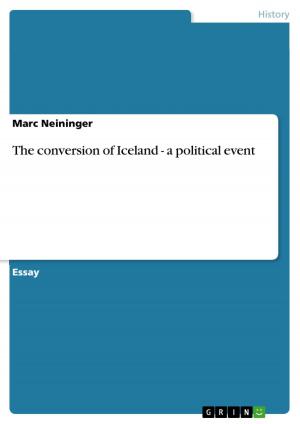How 'they' conquered England
Old norse pronominal borrowing in Middle English
Nonfiction, Entertainment, Drama, Anthologies| Author: | Martin Jähnert | ISBN: | 9783638059992 |
| Publisher: | GRIN Publishing | Publication: | June 9, 2008 |
| Imprint: | GRIN Publishing | Language: | English |
| Author: | Martin Jähnert |
| ISBN: | 9783638059992 |
| Publisher: | GRIN Publishing |
| Publication: | June 9, 2008 |
| Imprint: | GRIN Publishing |
| Language: | English |
Seminar paper from the year 2008 in the subject English Language and Literature Studies - Linguistics, grade: 1,3, University of Potsdam (Institut für Anglistik und Amerikanistik), course: Introduction to Middle English, 24 entries in the bibliography, language: English, abstract: The 'Modularbeit' is concerned with questions of language contact between Old Norse and Old English in the region later 'Danelaw', which might have influenced the modification of Old English third person plural pronomina with base 'h' into a new form with the base 'th', as we still know it today: 'they, them, their'. Walking through the streets of York several years ago, I was welcomed by a fierce-looking crowd of Vikings running towards me. In my case, though, the horde was just a group of actors commemorating regional history. At the end of the 8th century, Scandinavian Viking armies conquered different territories in Europe. England was attacked by Danish Vikings starting in the 780s . After several years of mere raiding, 851 marked their first stay during winter. The Danish conquests developed into a permanent settlement in some parts of England and finally led to a treaty signed in 886 between a Danish leader and the king of Wessex, then central power of England. The treaty acknowledged the Danish rule over Northeast England, the territory later being called Danelaw . The Danish influence ceased until 954 , but linguistic evidence of this contact with the Danes remains incorporated even in Modern English . One remarkable feature of this evidence is the English system of the third-person plural personal pronouns they, them, and their, whose development shall be examined more closely in this paper. In Modern English, 'they' plays an important role. On one hand, it can be used as a generic synonym for 'people' , often leading to an imprecise definition of who 'they' actually are. On the other hand, it has served as a common-gender substitution for the masculine third-person singular pronoun 'he' when speaking of a person of unknown sex. Most importantly and originally, however, 'they' has been a personal pronoun in the plural of the third person. The reasons for the use of pronouns are mainly economical, for abbreviation . An aforementioned object is referred to by a shorter word, the pronoun. Following this approach of linguistic economy, it is important to remark the difference between suppletion and grammaticalization, or between condensation and expansion .
Seminar paper from the year 2008 in the subject English Language and Literature Studies - Linguistics, grade: 1,3, University of Potsdam (Institut für Anglistik und Amerikanistik), course: Introduction to Middle English, 24 entries in the bibliography, language: English, abstract: The 'Modularbeit' is concerned with questions of language contact between Old Norse and Old English in the region later 'Danelaw', which might have influenced the modification of Old English third person plural pronomina with base 'h' into a new form with the base 'th', as we still know it today: 'they, them, their'. Walking through the streets of York several years ago, I was welcomed by a fierce-looking crowd of Vikings running towards me. In my case, though, the horde was just a group of actors commemorating regional history. At the end of the 8th century, Scandinavian Viking armies conquered different territories in Europe. England was attacked by Danish Vikings starting in the 780s . After several years of mere raiding, 851 marked their first stay during winter. The Danish conquests developed into a permanent settlement in some parts of England and finally led to a treaty signed in 886 between a Danish leader and the king of Wessex, then central power of England. The treaty acknowledged the Danish rule over Northeast England, the territory later being called Danelaw . The Danish influence ceased until 954 , but linguistic evidence of this contact with the Danes remains incorporated even in Modern English . One remarkable feature of this evidence is the English system of the third-person plural personal pronouns they, them, and their, whose development shall be examined more closely in this paper. In Modern English, 'they' plays an important role. On one hand, it can be used as a generic synonym for 'people' , often leading to an imprecise definition of who 'they' actually are. On the other hand, it has served as a common-gender substitution for the masculine third-person singular pronoun 'he' when speaking of a person of unknown sex. Most importantly and originally, however, 'they' has been a personal pronoun in the plural of the third person. The reasons for the use of pronouns are mainly economical, for abbreviation . An aforementioned object is referred to by a shorter word, the pronoun. Following this approach of linguistic economy, it is important to remark the difference between suppletion and grammaticalization, or between condensation and expansion .















